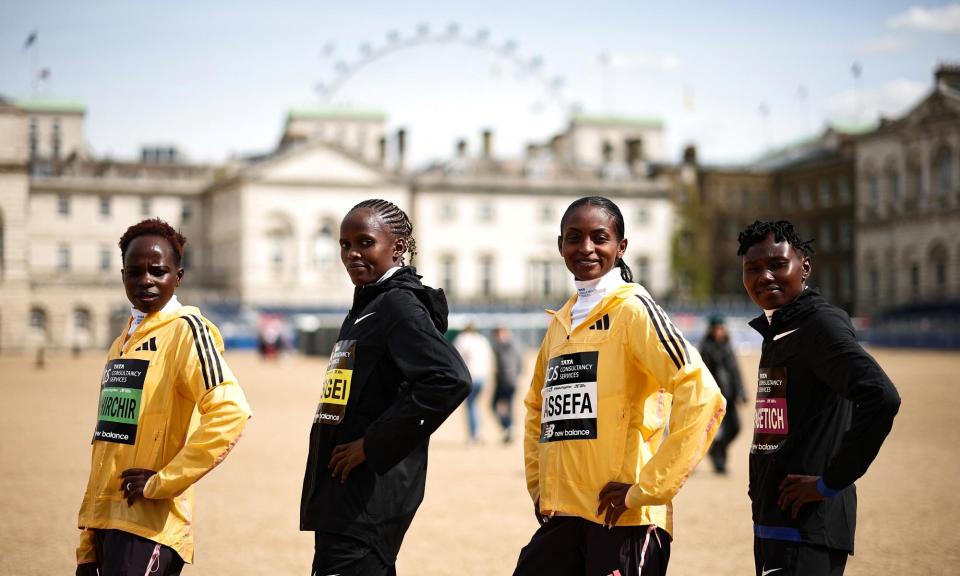Women’s London marathon will be ‘tougher race to win than Olympics’

There are so many history-makers and record breakers in Sunday’sLondon marathon that the race director, Hugh Brasher, reckons the women’s race will be even harder to win than the Olympics.
Hyperbole? Perhaps, given that the Paris route is brutally hilly and will be staged in the raging heat of summer. But Brasher also has a point, given the extraordinary quality that will be on display.
Related: Emile Cairess: ‘I definitely want to break Mo’s record. I can run a lot quicker’
Most eyes will be on the world record holder, Tigst Assefa, whose time of 2hr 11min 53sec in Berlin last year shattered the previous best by more than two minutes. But the Ethiopian is unlikely to have it easy in a field that includes seven women who have run under 2:17.30.
“No race in the history of our sport has ever had that,” says Brasher. “I have no idea who’s going to win but it’s going to be an incredibly competitive event. This will be a harder marathon to win than the Olympic marathon in Paris, I’m pretty certain of that.”
It is bound to be fast and furious, but with the Olympics less than four months away the sense is that the athletes’ minds will be on winning the race, and breaking Mary Keitany’s women’s-only world record of 2:17:01, rather than chasing the world record.
There are plenty of women who could do it, including the Olympic champion, Peres Jepchirchir, who is said to be back near her best after injuries, the former world record holder Brigid Kosgei and the two-time Chicago champion Ruth Chepng’etich. There has also been a strong word for a previous London champion, Yalemzerf Yehualaw, who is said to be training well.
In the men’s race, Kenenisa Bekele will attempt to turn back time and qualify for the Olympics at the grand age of 41. For many, the Ethiopian is the greatest distance athlete, having won three Olympic titles, five world gold medals, and broken multiple world records. For good measure he has also run a marathon in 2:01:41 – the third-fastest.
After a series of injuries in recent years, he knows this could be his last dance on the streets of London. “I will do my best to qualify, but all the athletes here are good, so it’s going to be a big challenge,” he says. “It doesn’t matter too much. I’ve been to many Olympics. If I win here I will qualify but if I just perform well I’ll be happy.
“It’s a been a long career for me. I’ve been running since 1999, almost 25 years, so it’s not a short time in any sport. But I’m happy to be running still and I enjoy it a lot.”
The favourite for the men’s race is Tamirat Tola, who was third last year before going on to win the New York marathon in November. An intriguing wildcard is Daniel Mateiko, a 25-year-old Kenyan who is trained by Eliud Kipchoge’s coach, Patrick Sang.
Mateiko has never completed a marathon. His half-marathon personal best is 58:26 and he was also able to stay with Kelvin Kiptum for 18 miles when the Kenyan, who died in a car crash in February, broke the world record in Chicago in October.
The race will also feature an intriguing domestic men’s contest with Emile Cairess, who beat Mo Farah in finishing sixth last year, expected to book his place in the British team for the Paris Olympics ahead of Marc Scott, who has moved up to the marathon. Some even believe that Cairess, whose pacemakers will take him through halfway in 63 minutes, could sneak a place on the podium given his form.
There will also be a welcome return of Callum Hawkins, who finished fourth at the 2017 and 2019 world championships but has struggled with injuries in the last three years – including ankle surgery, a torn hamstring and stress fractures in his femur and pelvis.
“The last few years have been pretty tough, since 2020,” he says. “My aim now is just to go out and enjoy being fit and able to run, because it feels like a miracle.”

